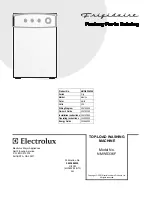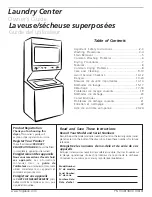
NLTroubleshooting
Malfunction
Cause
Troubleshooting
There are wipeable or
water-soluble deposits in
the interior or on the
door of the appliance.
White deposits form
inside the appliance.
1. Set the water softener correctly.
In most cases you will need to
increase the setting.
2.
Change the detergent if
necessary.
The softening salt
reservoir is not closed.
▶
Close the softening salt
reservoir.
There is white, hard-to-
remove deposits on the
dishes or on the interior
or door of the appliance.
Components of the
detergent are deposited.
This deposit usually
cannot be removed
chemically.
▶
Change from "dishwasher detergent"
▶
Clean the device mechanically.
Water hardness is incorrectly
set or water hardness is
higher than 50 °dH
(8.9 mmol/l).
▶
Set the water softener to the water
hardness or top up with softening
salt.
3in1 dishwasher detergent, bio
dishwasher detergent or eco
dishwasher detergent is
insufficiently effective.
▶
Set the water softener to the
water hardness and use
separate agents (quality
cleaning agent, softening
salt, rinse aid).
Dishwasher detergent is dosed
too low.
▶
Increase the detergent dosage
or change "dishwasher
Washing program too weak
chosen.
▶
Select a more powerful rinse
programme.
▶
Adjust the sensitivity of the
sensor system.
Tea or lipstick residue
on the dishes.
Washing temperature is too low.
▶
Select a program with a higher
washing temperature.
Dishwasher detergent has been
dosed too low or is unsuitable.
▶
Use a suitable "dishwasher
detergent"
Page 31and dose it
according to the manufacturer's
instructions.
Crockery has been pre-
cleaned too well. The sensor
system therefore opts for a
▶
Only remove coarse food residues
and do not pre-rinse the dishes.
56













































